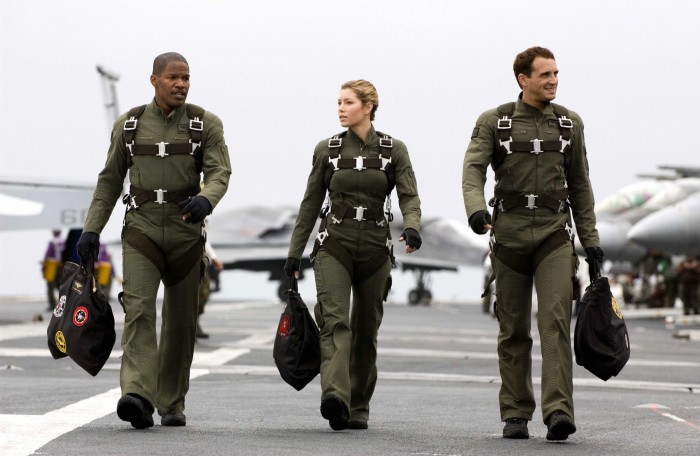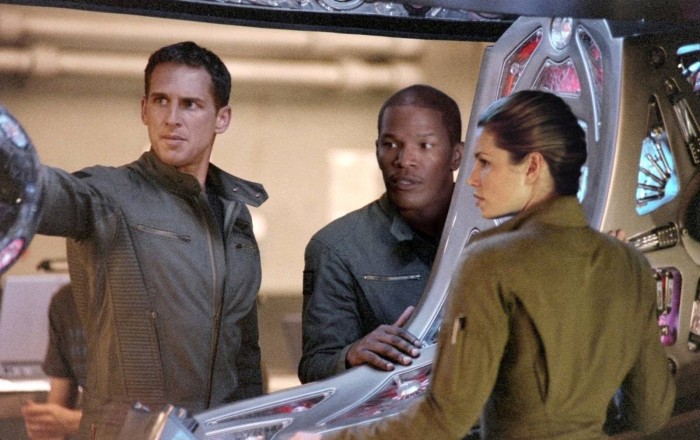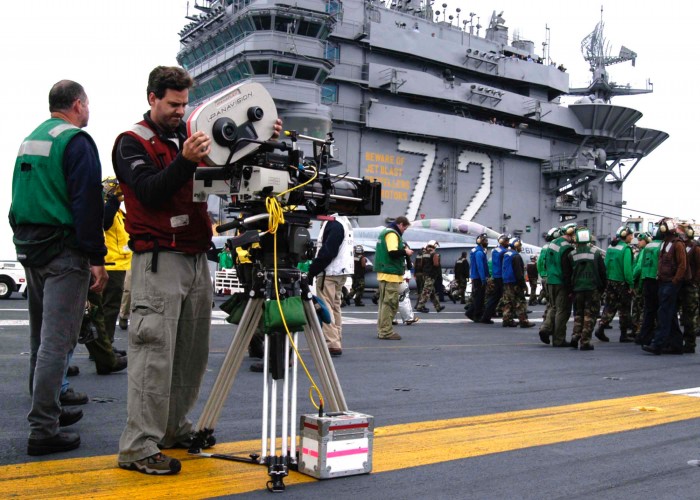How Did This Get Made: A Conversation With Jon Iles, Military Advisor Of 'Stealth'
We may receive a commission on purchases made from links.
If you stick around and watch the credits of almost any movie featuring armed combat, you're likely to find someone listed as that film's "Military Advisor." But what, exactly, does this job entail? And how much more realistic does their work make our movies?
To find out, we spoke with Jon Iles—a 25+ year veteran of the Royal Australian Navy—who has served as the Military Advisor on several films. An impressive roster that includes Suicide Squad, Mad Max: Fury Road and, of course, the movie it all began with: Stealth.
 How Did This Get Made is a companion to the podcast How Did This Get Made with Paul Scheer, Jason Mantzoukas and June Diane Raphael which focuses on movies This regular feature is written by Blake J. Harris, who you might know as the writer of the book Console Wars, soon to be a motion picture produced by Seth Rogen and Evan Goldberg. You can listen to the Stealth edition of the HDTGM podcast here.
How Did This Get Made is a companion to the podcast How Did This Get Made with Paul Scheer, Jason Mantzoukas and June Diane Raphael which focuses on movies This regular feature is written by Blake J. Harris, who you might know as the writer of the book Console Wars, soon to be a motion picture produced by Seth Rogen and Evan Goldberg. You can listen to the Stealth edition of the HDTGM podcast here.
Synopsis: A trio of Navy fighter pilots (Josh Lucas, Jamie Foxx and Jessica Biel) must stop an AI-controlled, top-secret stealth aircraft from starting the next world war.Tagline: Fear the Sky
Part 1: Happy Days
Blake J. Harris: Thanks, Jon, for taking the time to chat. Before we talk about Stealth and your work as a Military Advisor, I was curious what led you to the Navy in the first place. Was that always the plan?Jon Iles: I actually wanted to be a pilot when I was younger. In high school, all I thought about was airplanes. I wanted to be a fighter pilot. But when I went to go into the air force, they said I was colorblind. Because I failed an eye test, you know; the one with the colored dots. So I ended up joining the Navy because it was one of the only military units that would take me as someone who was "colorblind." Except the doctor actually read the test wrong. I wasn't colorblind.Blake J. Harris: Oh really?Jon Iles: Yeah! I could see red and blue and green. So one day I went back to the doctor and said, "You need to re-test me on this." He sent me to a specialist and the specialist turned around and said, "Yeah, you have great color perception."Blake J. Harris: Wow.Jon Iles: Cost me a year and a half in my career, but at the end of the day I was happy with where I went. To the Navy, the Frog Men.More specifically, Iles became a member of the Clearance Diving Branch, an elite diving unit of the Royal Australian Navy. Blake J. Harris: Flashing forward several years, you end up working on movies. The first being Stealth. How did that happen?Jon Iles: Essentially...when did this happen? About 13 or 14 years ago now. I was 25 years old. And I got approached by a stunt coordinator who I was training with in the gym to come to a meeting for Mad Max. So I had a meeting with George [Miller], which was about six hours long, just discussing very generic military-type tactics and what soldiers would do; what an assault force would do against a truck. Obviously without giving everything away; because I was still bound by military law so I can't give away the super secret stuff away, but the very generic stuff; you can give them some better ideas of how they would structure the attacks and such.Blake J. Harris: Okay, gotcha.Jon Iles: The meeting went well, but Mad Max didn't take off at that time. But in that meeting, there was a stunt coordinator who was working there and two weeks later he called me up and said, "Look, we've got this other movie. It's called Stealth. Would you mind coming in and having a quick look at some of the scenes that we're about to do because we want to have a good idea of what the military would do. So I sort of walked in and had a look at the scenes, and it really started from there.Blake J. Harris: Going into the experience on Stealth, what did you expect? And did it turn out to be what you expected?Jon Iles: Do you know what? It was a big eye-opener because it was the first time I was on a large set. You know, I'd worked with smaller TV stuff before. I'd worked with battle of the forces. And a few other TV programs...so I'd seen how the TV industry worked. But to go through a larger movie set like that and see the amount of time that's spent. And money. All of those things, all of those things that the military doesn't have. They don't have the time, they don't have the money. And all that good stuff.Blake J. Harris: That's hilarious (and very sad).Jon Iles: So it was quite a steep learning curve. Being a middle manager from the military for 30 years, you're basically responsible for everything; how the operation goes? What happens in the event that there's a man down? What happens when someone does get shot. So you control 80-90% of what's happening in the field. But when you got into the movies, you don't control any. You don't even really control the people that you train. Because all you're really doing is giving them ideas. Especially actors. You give them an idea of how it would work, and then they go, "No, actually, I want to play it this way." And so they do it their way. But at least you've shown them how a real military person would do it. So at least they know. But you've got to come to terms with that. But you do give advice. And if 1 or 2% of it gets taken, the happy days.Blake J. Harris: What type of advice do you give?Jon Iles: The actual nuts and guts of what a guy does with a gun; how he holds it, where he carries it, you know? How would people be positioned and postured? How would cars move? How would they stop? Where would they stop? And of course that's all intermixed with camera movement, and the director's going "I need to see this" and "I need to see that." So obviously you need to have a little bit of flexibility; it's all about giving the director what he wants to see so he can tell a story. And that was a very fast learning curve. But if you can pick those things up quickly, then you can value-add to a project. That's always been my philosophy: how can I add value to this project?Blake J. Harris: Good philosophy...Jon Iles: And I always give the director three different ways of doing something, so he's never hemmed into one approach. I always give him the most Wild Wild West; machine guns blaring and guns blowing up everything. And I always give him the actual military version; the down and dirty and efficient way. And then I do something left of center.Blake J. Harris: That's really fascinating. Of those three versions, is there one that tends to be selected for the movie? Or does it vary by project?Jon Iles: It really varies by director. What is your priority? Is your priority really good down and dirty hard fought military stuff? Is it very aggressive, quick and clean? Or is it showmanship? Do you want lots of bullets and shooting? Because then I can figure out: okay, how do we make fire reasonable. Because, you know, quite often in a movie, it's not reasonable. You watch the action on screen and can't help but think: They'd never do it that way! You're just wasting bullets!!Blake J. Harris: Ha!Jon Iles: So at the end of the day, it's up to the director. You might tell them, "they'd never do that," and they'll say, "Okay, but I still want 15 magazines unloaded." And you just say, "Yup, Roger That."
Part 2: Moving and Grooving
Blake J. Harris: Do you have any strong memories from working on Stealth?Jon Iles: I think that the biggest memory I have is from the scene where the hangar gets blown up; just the enormity and the danger that was involved with that one stunt...it's just a different level. So much effort and time and resources go into a shot that, really, is only on screen for 2 seconds.Blake J. Harris: And what about any memories with the principal actors? Did you have much interaction with them?Jon Iles: Yeah. I worked with Josh [Lucas]. Richard Norton—Richard was the stunt coordinator—and I worked with Josh for about six weeks on certain fight scenes. And then I worked with Jess, Jessica Biel, on some weapons handling stuff. She had tricky weapons that she had to reload, so I helped her with that; showed her how to hold it, where to hold it and where to stand.Blake J. Harris: It's kind of amazing (embarrassing) how much of this I never think about as an audience member.Jon Iles: [laughs] Overall, Stealth was pretty quick for me. And a lot of the stuff I did was with the Korean soldiers. Especially stuff with the helicopters.Blake J. Harris: You mentioned earlier that being a film's military advisor is largely a director-driven job. What was [director] Rob Cohen like to work with?Jon Iles: He was very gung-ho. Yeah. He wanted to see lots of aggression and lots of shoot-em-ups. Really charismatic. I think in the film he's actually shooting a 50 Cal at the end there. In one of the trucks.Blake J. Harris: [laughs]Jon Iles: He's like, "Jon, how do I shoot this thing?" I said, "Pull the trigger. Then keep pulling the trigger till all the ammo runs out. You don't want to stop. You just want to keep going." He says, "Okay, okay." [makes a bullet-firing sound] 100 rounds through the 50 Cal; he was whooping and hollering for a few minutes afterward. Yeah. So that's my memory of Rob Cohen.Blake J. Harris: After Stealth, it looks like you didn't work on another film for several years. I assume that's because your military obligations came first. But tell me about some of the projects you've worked on since returning to film.Jon Iles: So I worked on Stealth. Then Mad Max. And then I did a couple of TV series. After that, let's see...I did Unbroken. And then there was Gods of Egypt, which was just training all the soldiers how to march and move with speed. Then I worked on Suicide Squad. And then after Suicide Squad was Hacksaw Ridge.Blake J. Harris: Do you have a favorite from that list?Jon Iles: They each have their own highlights. But as far as being involved in a film... well, you know, in Mad Max I had a character. I was Ace; the guy on the side of the truck. So that was another eye-opener for me. Actually having to do the actor thing.Blake J. Harris: You strike me as a versatile guy.Jon Iles: Yeah...and pretending to be a soldier on the side of a truck? That's not such a far reach for me. So that was great. And I got to hang out with Charlize Theron for a very, very, long time. Plus the actors too. And being around that caliber of people in the acting world is great. You realize they're human beings at the end of the day...[laughs] they're just really good at acting.Blake J. Harris: Yeah...Jon Iles: Suicide Squad was another one that was great. Because in Suicide Squad I had a lot to do with how Will Smith moved and grooved. So I got to know Will fairly well. He's a professional; just so good at so many things. And Margot Robbie. I tried to nab her for a long time. She's a fantastic kid. And I got to work on a lot of the underwater scenes. So I felt like I got to add a lot of value.
Part 3: It’s Entertainment
Blake J. Harris: You've talked a bit about the compromise between what looks cool and what looks realistic. What are some of the things that happen in movies that are the most inaccurate that maybe someone like me wouldn't notice?Jon Iles: Yeah. I mean, you frequently see gunfights where one person takes on multiple people. And it doesn't matter who you are; you are going to die. That's the one thing. Lethal Weapon; one guy pulls out a gun and shoots five people. It just doesn't work that way. Just does not work that way.Blake J. Harris: Ha!Jon Iles: What else is there? Explosions. That's another classic. Like everything explodes... Well, I'm gonna tell you right now: nothing explodes unless you actually put explosives on it. So, you know, cars exploding and airplanes exploding and all that sort of stuff...I was talking with my business partner the other day, and we were talking about the reaction of a human being to explosions. So in movies you always see...they fly out, their bum facing out and their hands and legs traveling behind them.Blake J. Harris: Right.Jon Iles: In reality, it's the absolute opposite way. Your legs go first and then your body. Because of the pressure. So when you see a real one, it's just sickening; because the body contorts...what happens is the directors, over the years, go "well, no, that's how it is. That's what I want to see." Because they believe, that's what it is.Blake J. Harris: Right!Jon Iles: So in essence, reality wouldn't serve you much good. Because people would look at it and go: Oh, did they do that wrong? But in actual effect, it would be right.Blake J. Harris: Right.Jon Iles: But, you know, at the end of the day it's entertainment. It's not a bloody documentary. It's a movie. So, you know...you could do that for a documentary. You could make a documentary about all the things that are incorrect.Blake J. Harris: That actually sounds like a good idea for a documentary.Jon Iles: [laughs]Blake J. Harris: Just one last question for you. Whether it's Stealth or a different movie about combat, there's an inclination for movies to romanticize war. Or, at the least, they tell a story that makes you, as a viewer, enjoy spending time in that world. So for you, as someone who's actually done this stuff—who's been in combat and likely had friends and brothers die in the line of fire—is that weird for you? That people want to pay money to experience this thing?Jon Iles: You know what? I see it as entertainment. And entertainment is entertainment. People like to see a good guy, bad guy and whatever else. [long pause] I spent two years in a bomb disposal unit. And I trained up five guys that didn't make it. So there's five guys coming through my training routine who didn't make it...we know that going in. We sign on the line, and that's one of the things that we accept. So it can be strange to go into a movie like Hurt Locker and to know that it's totally false.Blake J. Harris: Okay...Jon Iles: A lot of the technical expertise wasn't portrayed very well. That's bullshit! You wouldn't do that in a million years! Now whether that was the director's call or the military advisor's call...who knows? But lots of people thought that movie was awesome. I mean, it's just turned EOD technicians—bomb technicians—into heroes. So in that regard, it's done a world of service for bomb technicians. Every single person who's seen the movie has a newfound respect for what bomb technicians do. And you know what?
At the end of the day: it's entertainment. At the end of the day, movies are entertainment.
